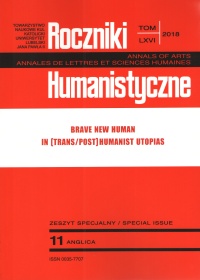Transhumanism and Utopia in Kenneth Folingsby’s Meda: A Tale of the Future
Abstrakt
Transhumanizm i utopia w powieści Meda: A Tale of the Future Kennetha Folingsby’ego
Artykuł analizuje ewolucyjny aspekt moralności w Meda: A Tale of the Future, dziewiętnastowiecznej utopii Kennetha Folingsby’ego, w kontekście transhumanistycznych rozważań dotyczących kwestii postępu w ujęciu Nicka Bostroma, Maxa More’a, i innych. Powieść Folingsby’ego, literackiego potomka The Coming Race Edwarda Bulwer-Lyttona, ważnej utopii ewolucyjnej późnej epoki wiktoriańskiej, ukazuje proces postępującego odcieleśnienia (disembodiment) futurystycznej eutopii jako skutku bezprecedensowego rozwoju ludzkiego mózgu. Podobnie jako ewolucyjna satyra Bulwera-Lyttona, Meda ukazuje tym samym transformację utopijnej społeczności w kontekście powiązania moralnego postępu z intelektualnym rozwojem.
Bibliografia
Armytage, W.H.G. “Extrapolators and Exegetes of Evolution.” Extrapolation: A Science Fiction Newsletter 7.1 (1965): 2–17. Web.
Bostrom, Nick. “Letter from Utopia.” (2010): n. pag. Web.
Bostrom, Nick. “Why I Want to be a Posthuman When I Grow Up.” The Transhumanist Reader: Classical and Contemporary Essays on the Science, Technology, and Philosophy of the Human Future. Ed. Max More and Natasha Vita-More. Malden: Wiley-Blackwell, 2013. 28–53. Print.
Bulwer-Lytton, Edward. The Coming Race. Edinburgh and London: William Blackwood And Sons, 1871. Print
Christensen, John M. “New Atlantis Revisited: Science and the Victorian Tale of the Future.” Science Fiction Studies 5.3 (1978): 243–49. Web.
Claeys, Gregory. “Socialism and the ‘Eugenic Turn’ in British Utopianism, 1875–1900”. The European Consortium for Political Research, 2004. Web.
Claeys, Gregory. “When Does Utopianism Produce Dystopia?”. Utopian Horizons. Ed. Zsolt Cziganyik. Budapest: Central European University Press, 2017. 41–61. Print.
Folingsby, Kenneth. Meda: A Tale of the Future. As Related by Kenneth Folingsby. Glasgow: Aird and Coghill, 1891. Print.
Gerber, Richard. Utopian Fantasy. New York: McGraw-Hill, 1973. Print.
Hauskeller, Michael. Mythologies of Transhumanism. Cham: Palgrave Macmillan, 2016. Print.
Hayles, N. Katherine. How We Became Posthuman: Virtual Bodies in Cybernetics, Literature, and Informatics. Chicago: Chicago University Press, 1999. Kindle Edition.
Hermann, Julia. “Possibilities of Moral Progress in the Face of Evolution.” Ethical Theory and Moral Practice. An International Forum. Springer, 2016. Web.
Heylighen, Francis. “The Global Brain as a New Utopia.” (2002). Web.
Jacobs, Naomi. “Dissent, Assent, and the Body in Nineteen Eighty-Four.” Utopian Studies 18.1 (2007): 3–20. Print.
Miller, Vincent. Understanding Digital Culture. Newbury Park: Sage Publications, 2011. Print.
More, Max. “The Philosophy of Transhumanism.” The Transhumanist Reader: Classical and Contemporary Essays on the Science, Technology, and Philosophy of the Human Future. Ed. Max More and Natasha Vita-More. Malden: Wiley-Blackwell, 2013. 3–17. Print.
Richards, Robert J. “Darwin on Mind, Morals and Emotions.” The Cambridge Companion to Darwin. Ed. Jonathan Hodge and Gregory Radick. Cambridge: Cambridge University Press, 2009. 96–119. Print.
Roden, David. Posthuman Life: Philosophy at the Edge of the Human. London and New York: Routledge, 2015. Print.
“Satiric Utopias”. The Spectator. Web.
Rubin, Charles T. Eclipse of Man. Human Extinction and the Meaning of Progress. New Atlantis Books, 2014. Print.
“Transhumanist Declaration (2012).” The Transhumanist Reader: Classical and Contemporary Essays on the Science, Technology, and Philosophy of the Human Future. Ed. Max More and Natasha Vita-More. Malden: Wiley-Blackwell, 2013. 54–55. Print.
Copyright (c) 2018 Roczniki Humanistyczne

Utwór dostępny jest na licencji Creative Commons Uznanie autorstwa – Użycie niekomercyjne – Bez utworów zależnych 4.0 Międzynarodowe.





